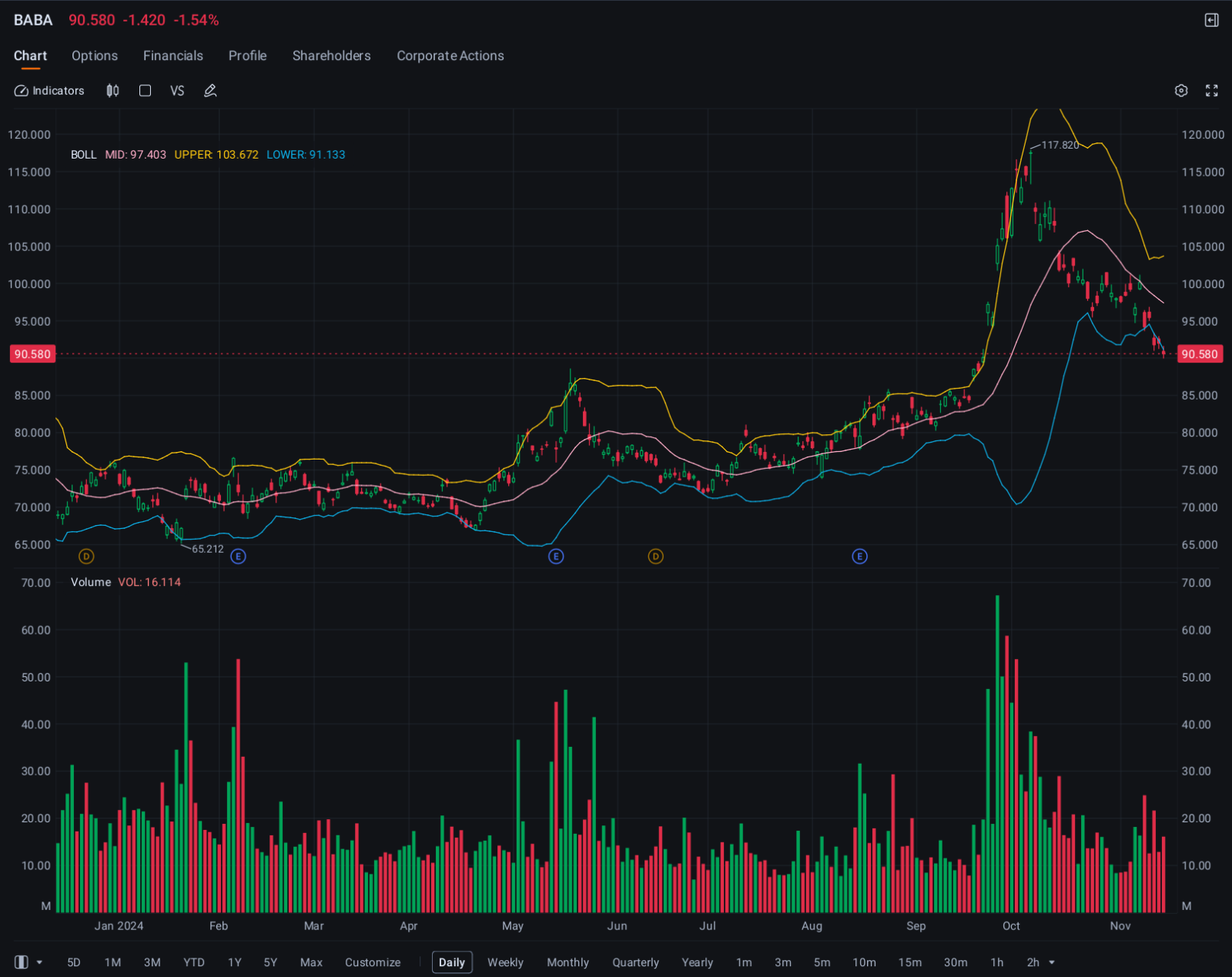Michael Burry's Scion Asset Boosts Stake in Alibaba, JD, Baidu, Buys Put Options
Michael Burry's Scion Asset Management boosted its stake in $Alibaba (BABA.US)$, $JD.com (JD.US)$ and $Baidu (BIDU.US)$ in the third quarter when these stocks rebounded, fueled by optimism over China's stimulus.
Scion reported a $21.2 million position in Alibaba, equal to 200,000 American depositary shares of the Chinese e-commerce giant as of Sept. 30, according to its 13-F filing with the Securities and Exchange Commission. That's an increase of 45,000 ADRs from the previous quarter, according to data compiled by Bloomberg.

Alibaba shares climbed in September to the highest since early 2023 as China announced a package of stimulus aimed at reviving the world's second largest economy. That rally has since fizzled as investors expressed concerns over the size of that package and whether it would be enough to accelerate growth.
Earlier this week, a Bloomberg survey showed economists are expecting the Asian nation's industrial output and retail sales to have expanded at a faster pace in October. The data are expected to be released Friday morning in China. Whether that's enough to boost the sales prospects for Alibaba's sites Taobao and Tmall is the big question.
While Alibaba remains Scion's biggest position, the investment firm is probably using options to hedge that investment. It had $17.9 million Alibaba put options as of Sept. 30, according to the filing that didn't specify the strike price or expiration of the contracts. It's unclear whether all the positions reported in the 13F filing have changed since the end of the third quarter.
(To see the market reaction in the options market when trading resumes, see Alibaba's options chain here.)
On average, Alibaba is expected to report revenue of 239.4 billion yuan for its fiscal second quarter ended Sept. 30, up from 234.2 billion yuan a year earlier, analyst estimates compiled by Bloomberg showed. Adjusted earnings is seen reaching 14.93 yuan per ADR, from 12.81 yuan a year earlier. The financial results are due Friday.
Hedge funds, pension funds, sovereign wealth funds and all investors required by the SEC to submit 13F boosted their stake in Alibaba by 15.9 million ADRs to 207.6 million in the third quarter, according to the latest Bloomberg tally of 5,641 filings for the third quarter. Those combined holdings were valued at $22 billion, the data showed.

Scion doubled its holdings in JD.com to 500,000 ADRs. That stake, the second biggest in its portfolio, was valued $20 million as of the reporting period. Scion's filing also showed a $20 million position in JD put options.
Put options can protect investors like Burry against continued stock slump. JD shares fell 4% Thursday even after the company's third quarter earnings beat analysts' estimates.
The investment firm likewise boosted its stake in Baidu by 50,000 ADRs, taking the total to 150,000. That stake was valued at $13.2 million. It reported an $8.77 million Baidu put options.
Disclaimer: Community is offered by Moomoo Technologies Inc. and is for educational purposes only.
Read more
Comment
Sign in to post a comment

TheOracleOfBroMaha : Again??
ZenZiDeR : Buy Put Options?? Isn't that mean Michael Burry is expecting China stock decline? Is it typo?
JohnKnee5 ZenZiDeR : After reading more of the article, looks like Michael is protecting his holdings on a downside risk by purchasing Put options. Look at the second last paragraph.
ZenZiDeR : Something fishy is on-going with china related stock now. Almost all the China related stock listed in US is green now. I mean post market.
$Alibaba (BABA.US)$
$PDD Holdings (PDD.US)$
$JD.com (JD.US)$
$Futu Holdings Ltd (FUTU.US)$
Samuel Lee ZenZiDeR : Michael brought these PUT options aims to guarantee an exit price.
If the price fall below the strike price (and the premium he brought), he can exercise them and sell back those stocks to the ones who sold PUT option to him.
Adrianlim90 : 1
Mr Careful TheOracleOfBroMaha : nice sequence. buy shares, then buy puts. maybe next will be sell shares to help create downward pressure followed by profiting from higher value of puts.
102611933 : I thought this burry guy only trades water after 2008? Why I started to see his damn name everywhere?
YuriKatz : small shark no power
Seraphicall ZenZiDeR : Hedging.
View more comments...